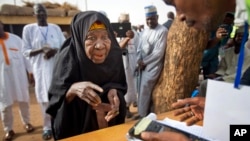A new report on aging populations finds that the care and respect African cultures have traditionally shown their elders may be endangered by a coming population increase.
Toby Porter, chief executive of HelpAge International, says, “Our key message to African governments, African populations, is now is the time to start planning for when your countries have larger older populations.”
HelpAge International, an organization that promotes and defends rights for older people, recently launched its Global Age Watch Index 2015 report. The index provides an overview of the quality of life experienced by older people in 96 countries – countries where more than 90 percent of the world’s over-60 population lives.
The study says Switzerland is the best country for older people, followed by Norway. Afghanistan was last, while several African countries ranked in the bottom 10.
Nearly 100 countries could not be included in the survey due to a lack of data on their older populations. The problem was acute in Africa, where researchers could include only 11 out of 54 countries on the continent.
“That’s one of the big stories of the index,” says Porter. “There aren’t enough countries that are collecting good data on their older people."
But the bigger story is that older Africans face harsh futures unless their families or governments can establish decent income sources and medical care for them. The over-60 population in Africa is growing, as medical advances allow people to live longer lives.
Porter says people often hear about how African cultures respect and care for their elderly. “Obviously there are very strong cultural reasons for those statements and in many ways they’re true," he says. "But the fact is that governments need to be planning now in order to be able to support families and communities and older people themselves to live long, healthy and secure.”
Four areas of concern for the elderly
The HelpAge International index focuses on four key areas of concern for older people -- income security, health, being respected and productive in their communities, and living in a conflict- and abuse-free environment.
All of the countries at the top of the global index began investing in universal pensions and age-appropriate healthcare decades ago -- in many cases more than a century ago when they were not rich countries, Porter says.
Those investments help explain the growing gap in life expectancy after age 60 between countries at the top and bottom of the index. In 1990, the gap was 5.7 years. By 2012, it grew to 7.3 years.
Porter said without changes, this inequality will continue to grow.
What is promising, says Porter, is that later this month governments will be committing to universal goals and targets until 2030 as outlined by the U.N. Sustainable Development Goals. He said these goals have been helpful to many aging advocacy groups around the world.
“We’re really seeing growing appreciation that older age cohorts are an incredibly important part of countries, of families, of societies. One of the broad themes of the Sustainable Development Goals is a theme of inclusion, a commitment to leave nobody behind in the next 15 years. And what we’ve been able to successfully argue is that older people have been at tremendous risk of being left behind by global and national development processes,” Porter stated.
Inclusion involves making sure older people have access to proper medical care and treatment for non-communicable diseases such as diabetes and cancer.
“When it comes to income, governments need to look at safety nets, pension payments for people of older age,” said Porter.




